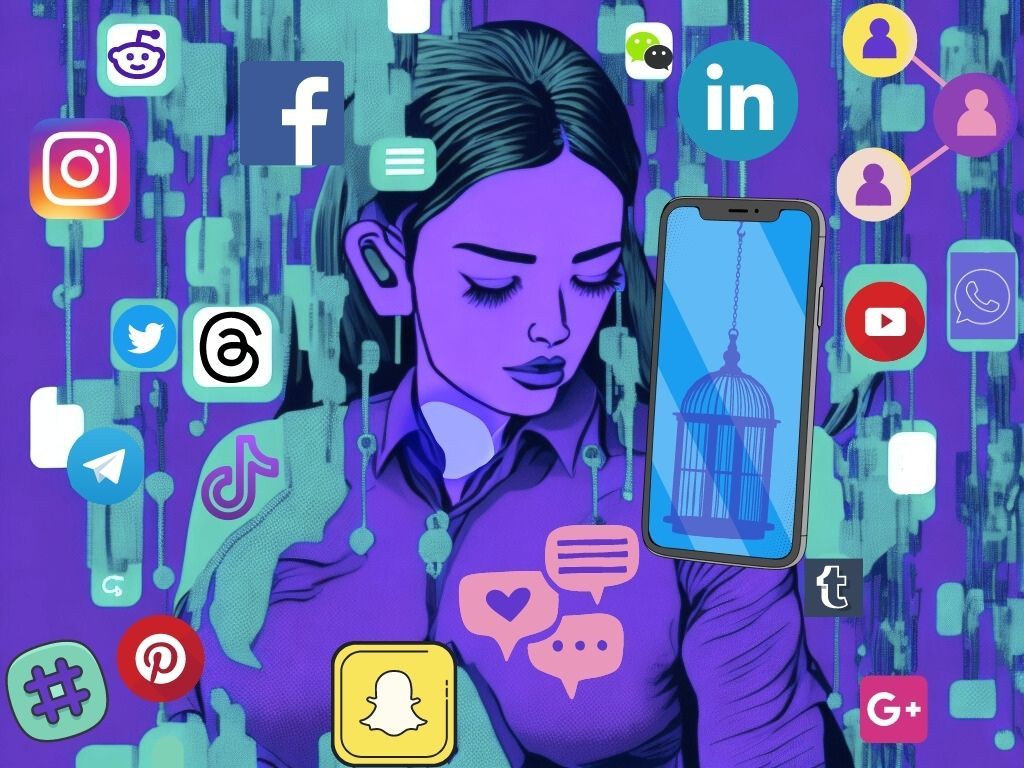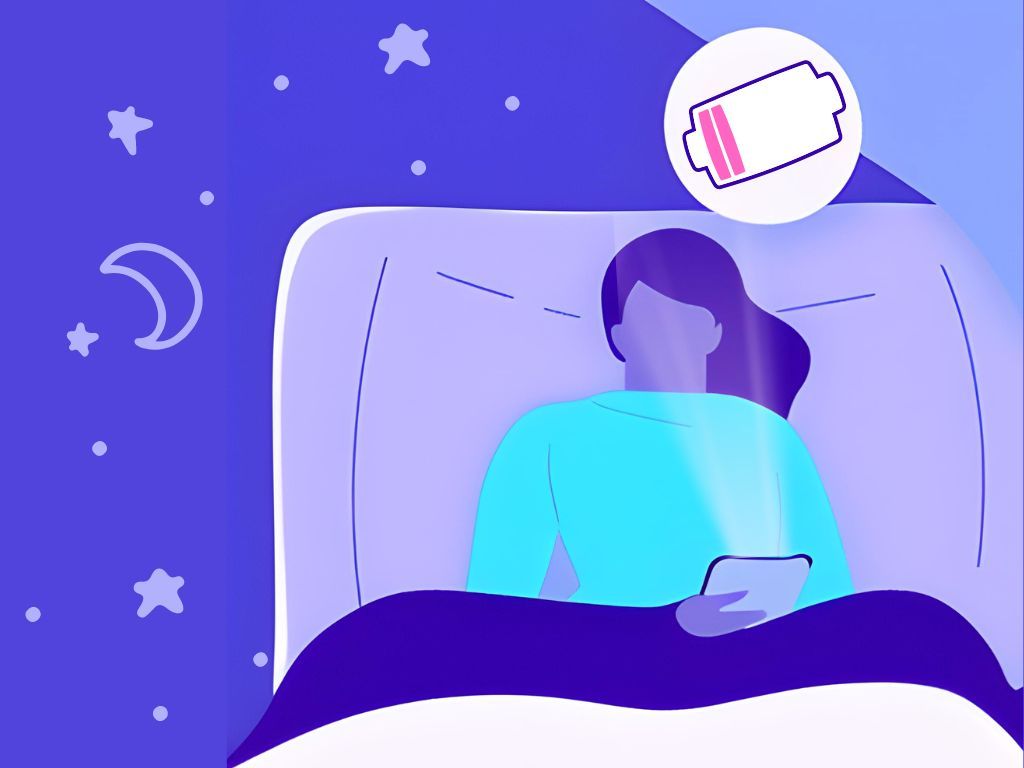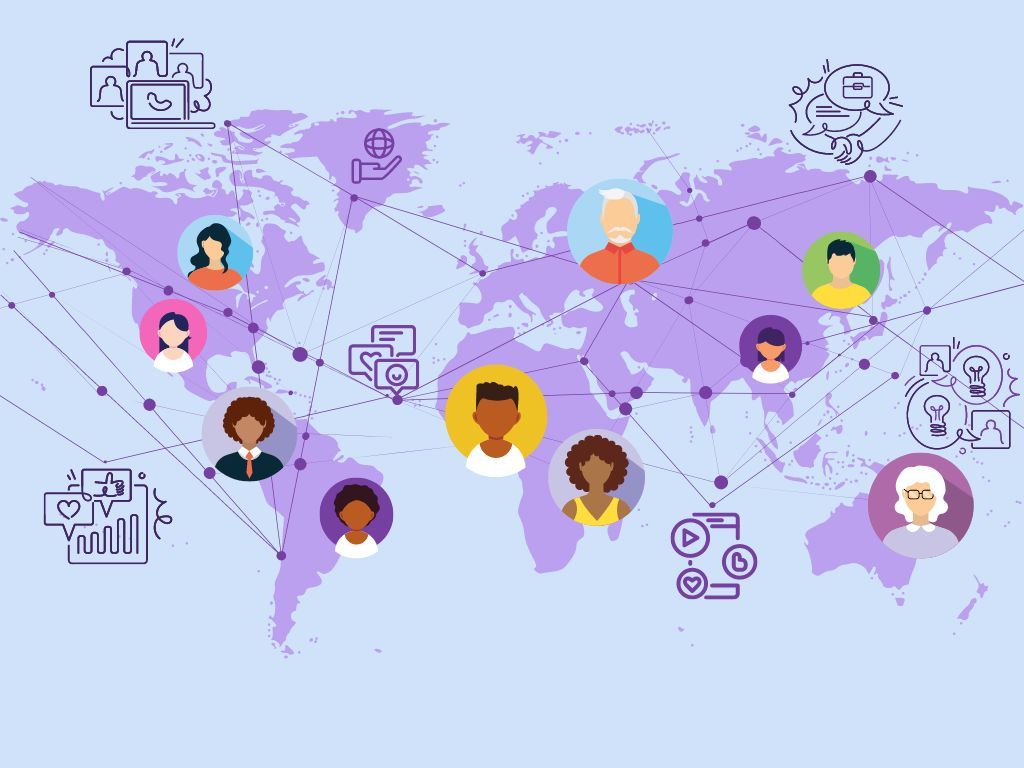Social Media and Mental Health: 12 Game-Changing Steps to a Happier and Healthier Digital Life
Uncover social media's impact on mental health – negatives like disrupted sleep and comparison stress, but also the benefits like connections and creativity. Take actionable steps for a healthier digital life and better well-being. Transform your relationship with social media today.

[Disclosure: This blog post was created with the assistance of AI technology]
In today's digital age, social media has become an integral part of our lives, impacting our mental well-being in various ways. To navigate this digital landscape and promote a healthier relationship with social media, it is essential to examine both the negative effects and the positive aspects it can bring.
In this article, we will explore the negative impact of social media on mental health, delve into the benefits it offers, and provide actionable steps that can lead readers to a happier and healthier digital experience.
By understanding the potential pitfalls, harnessing the advantages, and implementing practical strategies, you can transform your social media usage and foster well-being in your life. Let's embark on this journey to discover how to navigate social media for better mental health.
Negative Effects of Social Media

As we navigate the realm of likes, follows, and endless scrolling, it becomes evident that social media has its dark side. Worries surrounding disrupted sleep patterns, negative self-comparison, and the ever-present threat of addictive behaviors loom large.
Below, we will dive fearlessly into the depths of these concerns to shed light on the potential dangers lurking behind our screens. But fret not, for we won't stop there – we'll also unveil the positive aspects and empower you with actionable steps to ensure a healthier and happier relationship with social media.
- Disrupting Sleep Patterns: The blue light emitted by cellphones and screens can interfere with our circadian rhythm, leading to difficulty falling asleep and poorer sleep quality. This disruption can hurt mental health, including increased stress, decreased focus, and mood disturbances.
- Comparison and Envy: Social media feeds are often filled with carefully curated and filtered posts highlighting the best aspects of people's lives. Constant exposure to these seemingly perfect images can trigger feelings of inadequacy, envy, and self-comparison. This can contribute to negative self-perception, lowered self-esteem, and decreased overall life satisfaction.
- Filters and Body Image: Social media platforms offer various filters and editing tools that can alter one's appearance. This can lead to body dysmorphic disorders as individuals strive for an unrealistic and unattainable standard of beauty. It can also contribute to the development of eating disorders and a distorted perception of self-image.
- Time Drain and Reduced Productivity: Social media can be highly addictive and time-consuming. Scrolling through endless feeds, engaging in online discussions, and consuming an overwhelming amount of content can take away valuable time and energy. This can lead to decreased productivity, missed opportunities for real-life experiences, and a sense of dissatisfaction.
- Emotional Impact: Social media platforms are designed to capture attention and generate engagement. As a result, clickable content often includes shocking or provocative elements that stimulate strong emotional responses. Constant exposure to such content can activate the fight or flight response, increasing stress levels and impacting emotional well-being.
- Posture, Neck, and Shoulder Pain: Excessive phone usage can contribute to poor posture, leading to neck and shoulder pain. The prolonged forward head position and hunching over devices can strain the neck and shoulder muscles, potentially causing discomfort and chronic pain.
- Headaches: Frequent and prolonged phone usage, coupled with poor posture and eye strain, can trigger tension headaches or migraines. The visual strain and excessive screen time can contribute to eye fatigue and headaches.
- Potential for Addictive Behaviors: One of the most troubling aspects of social media is its potential to trigger addictive behaviors. The never-ending feed of captivating content, the allure of likes and comments, and the fear of missing out (FOMO) create a cycle of compulsive scrolling and checking. With each notification, our brains receive a hit of dopamine, the pleasure neurotransmitter, reinforcing the urge to return for more. Before we know it, hours slip away, and we find ourselves trapped in a digital vortex, neglecting real-life experiences and relationships. The addictive nature of social media can lead to decreased productivity, increased stress, and a sense of dependency that can be challenging to break free from.
- Cyberbullying: Social media platforms provide an avenue for negative behaviors, including cyberbullying, where individuals can be targeted with hurtful comments, harassment, or threats. The anonymity and distance offered by social media can embolden some users to engage in harmful behaviors that can severely affect the victim's mental health. Cyberbullying can lead to feelings of anxiety, depression, and social isolation, making it essential to address this issue and create safer online environments for everyone.
Harnessing the Benefits of Social Media

Every phenomenon has two sides, and the world of social media is no exception -- while it can impact our mental well-being negatively, it also holds the potential for positive influence.
Having explored the negative aspects affecting our sleep, self-perception, and time management, it's equally vital to acknowledge the positive aspects it brings to maintaining connections, inspiring creativity, and raising awareness.
Now, let's explore the brighter side of social media and uncover how it can positively impact our well-being and personal growth.
- Maintaining Connections: Social media provides a convenient way to stay connected with friends, family, and like-minded individuals. It allows us to share moments, exchange messages, and foster meaningful relationships, even when physically apart. It offers a sense of community and support, enhancing our overall well-being.
- Personal Journal: Social media platforms can serve as a digital journal, allowing us to document and reflect on our own life experiences. Sharing memories, achievements, and personal growth can provide a sense of fulfillment and help us track our journey. It also offers an opportunity for self-expression and creative exploration.
- Creative Expression and Inspiration: Social media offers a platform for individuals to express their creativity and showcase their artistic talents. It provides a space for sharing artwork, photography, writing, music, and other forms of creative expression, fostering inspiration and connecting artists with a wider audience. It can also help us become more creative.
- Information Sharing and Awareness: Social media platforms serve as powerful tools for disseminating information, news, and raising awareness about important social issues, promoting education and social change.
- Professional Networking and Career Opportunities: Social media platforms like LinkedIn provide opportunities for professional networking and career development. Individuals can connect with industry professionals, join relevant communities, and access job opportunities, ultimately enhancing their professional growth and expanding their professional network.
- Support and Empowerment Communities: Social media allows individuals to connect with support groups and communities centered around specific interests, challenges, or health conditions. These communities provide a safe space for individuals to share experiences, seek advice, and support others facing similar circumstances, fostering a sense of belonging and empowerment.
- Advocacy and Activism: Social media is a powerful platform for raising awareness and advocating for social causes, human rights, and environmental issues. It provides a space for individuals to mobilize and amplify their voices, driving positive change and social impact.
- Global Connections and Cultural Exchange: Social media bridges geographical barriers, allowing individuals from around the world to connect and exchange ideas, cultures, and perspectives. It fosters intercultural understanding, promotes empathy, and expands global connections.
Actionable Steps for a Healthier Social Media Experience

Ready to transform your social media experience for a happier, healthier you? Now that we've explored the positive impact of social media, it's time to unleash the power of actionable steps.
These practical strategies will empower you to curate your digital world, embrace mindful consumption, and build meaningful connections. Get ready to reclaim your time, nurture your well-being, and foster genuine joy as you embark on this transformative journey.
Let's explore these game-changing steps that will lead you to a more mindful and fulfilling online life. Get set to unlock a brighter, happier digital you!
- Set Time Limits: Set boundaries and limit the amount of time you spend on social media. Determine specific time blocks or daily limits to prevent excessive usage. Utilize tools such as app timers or productivity apps to track and manage your social media time effectively.
- Embrace "Cell-Phone Jail": Designate specific times when you will disconnect from your phone during the day. For example, create a box or shelf where you place your cell phone after a certain hour (preferably after 6 PM) until the following morning (around 7 AM). This practice allows you to spend quality time with your family or roommates, fostering genuine connections and reducing digital distractions. It also allows our bodies to rest in the evenings and prepare for nighttime sleep.
- Disconnect During Meals: Make a conscious effort to disconnect from social media during meal times. Engaging with our phones while eating can disrupt digestion and reduce the enjoyment of meals. By disconnecting from screens, we can focus on savoring our food, cultivating a mindful eating practice, and allowing our bodies to digest food more effectively. Creating a phone-free zone during meals provides an opportunity to relax, connect with family or friends, and fully appreciate the nourishment and pleasure of dining without distractions.
- Practice Mindful Consumption and Curate Your Feed: Be conscious of the content you consume on social media. Regularly review and adjust the list of accounts you follow on social media. Unfollow or mute accounts that contribute to stress, comparison, or negative emotions. Instead, seek out accounts that inspire, educate, and promote positivity in areas such as mental health, self-care, personal growth, and hobbies.
- Disable Notifications: Reduce interruptions and the constant need to check your phone by disabling notifications from social media apps. This helps break the cycle of instant gratification and reduces the impact of the dopamine effect triggered by new notifications. By regaining control over notifications, you can focus on more meaningful activities and reduce the urge to constantly check your social media accounts.
- Cultivate a Digital Detox Routine: Incorporate regular periods of digital detox into your routine. Designate specific days, weekends, or holidays as screen-free times to disconnect from social media and focus on meaningful offline activities. Use this time to engage in hobbies, spend quality time with loved ones, or simply relax and recharge.
- Engage in Active Participation: Instead of passively scrolling through social media feeds, actively engage with content and participate in meaningful discussions. Share your thoughts, experiences, and support others in a positive and constructive manner. Engaging actively can help foster genuine connections and create a more fulfilling social media experience.
- Embrace Body Positivity: Resist using filters and appreciate your authentic self. Accept and celebrate your unique features, focusing on self-love and body positivity. Challenge societal beauty standards and embrace the diversity of body shapes, sizes, and appearances.
- Practice Self-Care Rituals: Incorporate self-care practices into your daily routine to nurture your mental and emotional well-being. Prioritize activities such as meditation, journaling, exercise, or spending time in nature. By dedicating time to self-care, you can build resilience, reduce stress, enhance your overall happiness, and avoid excessive social media consumption.
- Set Intentional Time Blocks: Rather than constantly checking social media throughout the day, establish specific time blocks for social media usage. Allocate a limited amount of time dedicated solely to engaging with social media content, and be mindful of not exceeding that allotted time. This helps prevent mindless scrolling and promotes a healthier balance between online and offline activities.
- Rethink Metrics: Define your goals and values on social media. Instead of solely focusing on likes and follower counts, shift your attention to meaningful engagement, connections, and personal growth. Measure success based on the value you provide, the connections you make, and the positive impact you have on others. This perspective helps you build a healthier relationship with social media and reduces the potential for comparison and negative self-perception.
- Celebrate Your Moments: Use social media as a tool to revisit your own joyful memories. Scroll through your own photos and videos, reliving happy moments, achievements, and experiences. By sharing and celebrating your own journey, you can activate the pleasure response in your brain and reinforce positive emotions, self-appreciation, and gratitude.
In conclusion
In the ever-evolving digital landscape, social media holds a prominent place in our lives, influencing our mental well-being in multifaceted ways. To foster a healthier relationship with social media and promote better mental health, it is crucial to strike a balance between its positives and negatives.
In this article, we explored the negative impact of social media, from disrupted sleep patterns to comparison-induced stress, body image concerns, and time drain. However, we also celebrated the benefits of maintaining connections, personal expression, information sharing, and advocacy that social media brings.
Armed with this understanding, we provided actionable steps to navigate the digital realm consciously. By setting time limits, embracing "cell phone jails," disconnecting during meals, and practicing mindful consumption, readers can foster a happier and healthier digital experience. Engaging in active participation, practicing self-care rituals, and redefining success metrics also contribute to a balanced and positive social media journey.
Let us embark on this transformative journey, harnessing the benefits and implementing practical strategies to create a healthier, happier, and more mindful relationship with social media for better mental health.
Remember, it's in our hands to shape a healthier and happier digital life!
Sources:
- Newsom, Rob, and Dr. Abhinav Singh. "How Blue Light Affects Sleep." Sleep Foundation, March 17, 2023.
- Jiang, Shaohai, and Annabel Ngien. "The Effects of Instagram Use, Social Comparison, and Self-Esteem on Social Anxiety: A Survey Study in Singapore." Sage Journals, May 6, 2020.
- Fleps, Bella. "Social media effects on body image and eating disorders." Illinois State University, April 21, 2021.
- Kelly, Jack. "The Problem With Scrolling Through Social Media During The Workday." Forbes, Jul 10, 2023.
- Roberts, Nicole F. "Your Brain On Drama: What Social Media Means For Your Personal Growth." Forbes, Aug 10, 2018.
- Asher, Anne. "Could Your Smart Phone Be Ruining Your Cervical Spine?" Verywell Health, March 07, 2022.
- Rogers, Kristen. "Smartphones may make your headaches worse, study finds." CNN, March 4, 2020.
- McIntosh, Kody."Fight or Flight: The Social Media Drug." Nexus Magazine.
- "Cyberbullying: What is it and how to stop it: What teens want to know about cyberbullying." UNICEF.
- Elrashidy, Yousef. "The power of social media: Connecting and engaging in the digital age." The Times of India, Feb 17, 2023.
- "Can social networks help us be more creative?" University of Rochester, December 9, 2020.
- "Social media as a news source." Wikipedia.
- Sreenivasan, Sree. "How to Use Social Media in Your Career." The New York Times.
- Hardie, Sienna. "Social Media Communities as Support Networks: Empowering Others During Crisis Situations." Networkconference.Netstudies.org
- Zubernis, Lynn, reviewed by Michelle Quirk. "Can Social Media and Online Communities Be Good for Us?" Psychology Today, March 28, 2023.
- "A Guide to Activism in the Digital Age." Maryville University.
- Taylor, Anna Noel. "Around the World, Social Media Is a Source of Connection, Creativity and Empowerment." Paramount Insights, May 2, 2018.
- Capritto, Amanda. "Why you shouldn't scroll through your phone while eating." CNET, Oct. 22, 2019